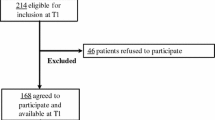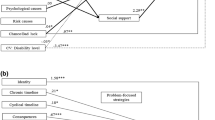Abstract
This study examined the differential predictive utility of attributional style and arthritis helplessness on self-report and observer-report measures of disability. Forty-two individuals from an outpatient rheumatology clinic were followed over the course of 1 year and completed measures of attributional style, arthritis helplessness, depression, pain, and disability at Time 1 and Time 2. Objective measures of functional disability were completed by a physician’s assistant after routine physical examinations at both time periods. Results revealed that a pessimistic attributional style at Time 1 significantly predicted lower self-rated disability at Time 2. Similarly, greater arthritis helplessness at Time 1 predicted lower physician-rated disability at Time 2. Results are discussed with particular focus on the utility of differential disability assessments and the potential role of cognitive-behavioral interventions in treating individuals with rheumatoid arthritis.
Similar content being viewed by others
References
Abramson, L. Y., Seligman, M. E. P., & Teasdale, J. D. (1978). Learned helplessness in humans: Critique and reformulation. Journal of Abnormal Psychology, 87, 49–74.
American Psychiatric Association. (1994). Diagnostic and statistical manual of mental disorders (4th ed.). Washington, DC: Author.
Barlow, J. H., Turner, A. P., & Wright, C. C. (1998). Long-term outcomes of an arthritis self-management programme. British Journal of Rheumatology, 37, 1315–1319.
Callahan, L. F., Brooks, R. H., & Pincus, T. (1988). Further analysis of learned helplessness in rheumatoid arthritis using a Rheumatology Attitudes Index. The Journal of Rheumatology, 15, 418–426.
Chaney, J. M., Mullins, L. L., Uretsky, D. L., Doppler, M. J., Palmer, W. R., Wees, S. J., Klein, H. S., Doud, D. K., & Reiss, M. J. (1996a). Attributional style and depression in rheumatoid arthritis: The moderating role of perceived illness control. Rehabilitation Psychology, 3, 205–223.
Chaney, J. M., Uretsky, D. L., Mullins, L. L., Doppler, M. J., Palmer, W. R., Wees, S. J., Klein, H. S., Doud, D. K., & Reiss, M. J. (1996b). Differential effects of age and illness duration on pain-depression and disability-depression relationships in rheumatoid arthritis. International Journal of Rehabilitation and Health, 2, 101–112.
Clarke, A. E., & Fries, J. F. (1992). Health status instruments and physical examination techniques in clinical measurement methodologies. Current Opinion in Rheumatology, 4, 145–152.
Cronbach, L. (1951). Coefficient alpha and the internal structure of tests. Psychometrika, 16, 297–334.
DeVellis, B. M., & Blalock, S. J. (1992). Illness attributions and hopelessness depression: The role of hopelessness expectancy. Journal of Abnormal Psychology, 101, 257–264.
Frank, R. G., Chaney, J. M., Clay, D. L., & Kay, D. R. (1991). Depression in rheumatoid arthritis: A re-evaluation. Rehabilitation Psychology, 36, 219–230.
Frank, R. G., Chaney, J. M., Clay, D. L., Shutty, M. S., Beck, N. C., Kay, D. R., Elliott, T. R., & Grambling, S. (1992). Dysphoria: A major symptom factor in persons with disability or chronic illness. Psychiatry Research, 3, 231–241.
Fries, J. F., Spitz, P., Kraines, R. G., & Holman, H. R. (1980). Measurement of patient outcome in arthritis. Arthritis and Rheumatism, 23, 137–145.
Gerber, L. (1988). Outcome measures in rheumatic disease. In J. Hicks, J. Nichols, & R. Sweezy (Eds.), Handbook of rehabilitative rheumatology (pp. 9–19). Atlanta, GA: American Rheumatism Association.
Hidding, A., van Santen, M., De Klerk, E., Gielen, X., Boers, M., Geenen, R., Vlaeyen, J., Kester, A., & van der Linden, S. (1994). Comparison between self-report measures and clinical observations of functional disability in ankylosing spondylitis, rheumatoid arthritis and fibromyalgia. Journal of Rheumatology, 21, 818–823.
Hommel, K. A., Chaney, J. M., Mullins, L. L., Palmer, W., Wees, S., & Klein, H. (1998). The relative contributions of attributional style and arthritis helplessness to depression in rheumatoid arthritis: A longitudinal investigation. International Journal of Rehabilitation and Health, 4, 59–67.
Hommel, K. A., Chaney, J. M., Mullins, L. L., Palmer, W., Wees, S., & Klein, H. (2000). The contribution of attributional style to perceived disability in rheumatoid arthritis: A longitudinal study. Journal of Clinical Psychology in Medical Settings, 7, 113–120.
Leibing, E., Pfingsten, M., Bartmann, U., Rueger, U., & Schuessler, G. (1999). Cognitive-behavioral treatment in unselected rheumatoid arthritis outpatients. Clinical Journal of Pain, 15, 58–66.
Nicassio, P., Wallston, K., Callahan, L., Herbert, M., & Pincus, T. (1985). The measurement of helplessness in rheumatoid arthritis: The development of the Arthritis Helplessness Index. Journal of Rheumatology, 12, 462–467.
O’Leary, A., Shoor, S., Lorig, K., & Holman, H. R. (1988). A cognitive-behavioral treatment for rheumatoid arthritis. Health Psychology, 7, 527–544.
Parker, J. C., & Wright, G. E. (1995). The implications of depression for pain and disability in rheumatoid arthritis. Arthritis Care and Research, 8, 279–283.
Peterson, C., Semmel, A., von Baeyer, C., Abramson, L., Metalsky, G., & Seligman, M. (1982). The Attributional Style Questionnaire. Cognitive Therapy and Research, 6, 287–300.
Pincus, T., Summey, J., Soraci, S., Wallston, K., & Hummon, N. (1983). Assessment of patient satisfaction in activities of daily living using a modified Stanford Health Assessment Questionnaire. Arthritis and Rheumatism, 26, 1346–1353.
Schiaffino, K. M., & Revenson, T. A. (1992). The role of perceived self-efficacy, perceived control, and causal attributions in adaptation to rheumatoid arthritis: Distinguishing mediator from moderator effects. Personality and Social Psychology Bulletin, 18, 709–718.
Schiaffino, K., & Revenson, T. (1995). Why me? The persistence of negative appraisals over the course of illness. Journal of Applied Social Psychology, 25, 601–619.
Shaw, W., Cronan, T., & Christie, M. (1994). Predictors of attrition in health intervention research among older subjects with osteoarthritis. Health Psychology, 13, 421–431.
Smith, C. & Wallston, K. (1992). Adaptation in patients with chronic rheumatoid arthritis: Application of a general model. Health Psychology, 11(3), 151–162.
Smith, C., Wallston, K., & Dwyer, K. (1995). On babies and bathwater: Disease impact and negative affectivity in the self-report of persons with rheumatoid arthritis. Health Psychology, 14, 64–73.
Smith, T., Christensen, A., Peck, J., & Ward, J. (1994). Cognitive distortion, helplessness, and depressed mood in rheumatoid arthritis: A four-year longitudinal analysis. Health Psychology, 13, 213–217.
Smith, T. W., Peck, J. R., Milano, R. A., & Ward, J. R. (1988). Cognitive distortion in rheumatoid arthritis: Relation to depression and disability. Journal of Consulting and Clinical Psychology, 56, 412–416.
Smith, T., Peck, J., & Ward, J. (1990). Helplessness and depression in rheumatoid arthritis. Health Psychology, 9, 377–389.
Stein, M., Wallston, K., & Nicassio, P. (1988). Factor structure of the Arthritis Helplessness Index. Journal of Rheumatology, 15, 427–432.
Stein, M. J., Wallston, K. A., Nicassio, P. M., & Castner, N. M. (1988). Correlates of a clinical classification schema for the arthritis helplessness subscale. Arthritis and Rheumatism, 31, 876–881.
van der Heide, A., Jacobs, J. W. G., van Albada-Kuipers, G. A., Kraaimaat, F. W., Geenen, R., & Bijlsma, J. W. J. (1994). Physical disability and psychological well beingin recent onset rheumatoid arthritis. Journal of Rheumatology, 21, 28–32.
Wilder, R. (1993). Rheumatoid arthritis. In H. R. Schumacher, Jr., J. H. Klippel, & W. J. Koopman (Eds.), Primer on the rheumatic diseases (10th ed. pp. 86–89). Atlanta, GA: Arthritis Foundation.
Young, L. D., Bradley, L. A., & Turner, R. A. (1995). Decreasesin health care resource utilization inpatients with rheumatoid arthritis following a cognitive behavioral intervention. Biofeedback and Self Regulation, 20, 259–268.
Zimmerman, M., & Coryell, W. (1987). The Inventory to Diagnose Depression: A self-report scale to diagnose major depressive disorder. Journal of Consulting and Clinical Psychology, 55, 55–59.
Zimmerman, M., & Coryell, W. (1988). The validity of a self-report questionnaire for diagnosing major depressive disorder. Archives of Disease-Unrelated Psychiatry, 45, 738–740.
Zimmerman, M., Coryell, W., Wilson, S., & Corenthal, C. (1986). Evaluation of symptoms of major depressive disorder: Self-report vs. clinician ratings. Journal of Nervous and Mental Disease, 174, 150–153.
Author information
Authors and Affiliations
Rights and permissions
About this article
Cite this article
Hommel, K.A., Wagner, J.L., Chaney, J.M. et al. Prospective contributions of attributional style and arthritis helplessness to disability in rheumatoid arthritis. Int. J. Behav. Med. 8, 208–219 (2001). https://doi.org/10.1207/S15327558IJBM0803_3
Issue Date:
DOI: https://doi.org/10.1207/S15327558IJBM0803_3




